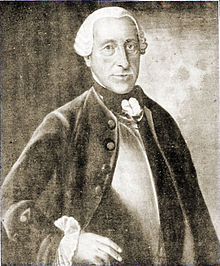Reinhard von Pelden called Cloudt
Reinhard Heinrich Bertram Vinzenz Freiherr von Pelden called Cloudt zu Lauersfort and Impel (* 1702 , † April 1, 1770 in Moers ) was a German administrative lawyer and Prussian government president of the Principality of Moers .
Life
Reinhard von Pelden-Cloudt was born as the second son of Baron Jost Wirich von Pelden called Cloudt zu Lauersforst, Bloemersheim and Sollbrüggen and Baroness von Kinsky zu Tervoort and Stein in the county of Moers. He studied from 1724 to 1728 at the Ludwig University of Giessen . After graduating, he entered the Prussian administrative service. On March 9, 1731, Friedrich Wilhelm I appointed him to the government council in the Principality of Moers as a member of the War and Domain Commission for Geldern. On June 17, 1742, von Pelden-Cloudt was appointed dike commissioner. Six months later, he was appointed judicial councilor at Moers' main and criminal court. Friedrich II appointed him on November 23, 1749, initially as Vice President and later as District President of the Principality of Moers. He held this office during the Seven Years' War , in which Moers was occupied by the French.
During this time Reinhard von Pelden-Cloudt lived in the Impel house in Moers with his unmarried sister Charlotte.
When the priest Johann Heinrich Mische, a protégé of Pelden-Cloudts, accused him of corruption, Friedrich II dismissed the district president from his office. Initially, Reinhard von Pelden-Cloudt did not recognize the scope of the accusation and did not contradict it. Ten years earlier he had appointed Mische pastor of the Kapellen parish and received a recognition fee of 300 Reichstalers. As Lord of Lauersfort, he exercised the right of patronage and parish appointments in the parish chapels .
The acceptance of this fee was rumored by Mischen when the district president refused the pastor permission to make structural changes to the parish buildings. Von Pelden-Cloudt suffered several strokes in the year he was released, so that his health was unable to protest against his impeachment from the king in Berlin.
Von Pelden-Cloudt retained the office of dike commissioner until his death.
Remarks
- ↑ The building was destroyed in World War II. In its place is now the Gerhard Tersteegen House of the Protestant parish of Moers.
- ↑ Verhuven 1939, p. 128.
literature
- Reinhard Feinendegen: The Lower Rhine nobility of modern times and their property. An investigation into the Moers Drosten family von Pelden called Cloudt. (= Rheinisches Archiv. Volume 55). Ludwig Röhrscheid, Bonn 1961.
- Richard Verhuven: Monographs on the history of the principality of Moers. In: Castle and town on the Lower Rhine 1000 years of German craftsmanship. Festschrift. (= Special issue of the Krefeld magazine for Niederrheinische Heimatpflege "Die Heimat". Volume 17, 1938). P. 123ff.
| personal data | |
|---|---|
| SURNAME | Pelden called Cloudt, Reinhard von |
| ALTERNATIVE NAMES | Pelden-Cloudt, Reinhard von; Pelden called Cloudt zu Lauersfort and Impel, Reinhard Heinrich Bertram Vinzenz Freiherr von (full name) |
| BRIEF DESCRIPTION | Prussian district president |
| DATE OF BIRTH | 1702 |
| DATE OF DEATH | April 1, 1770 |
| Place of death | Moers |
